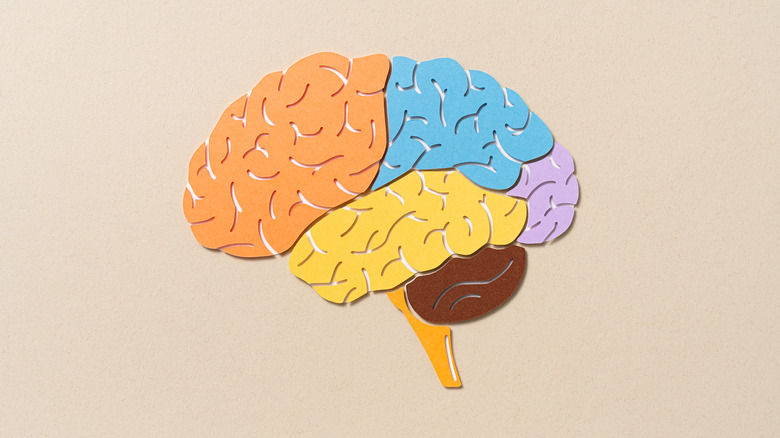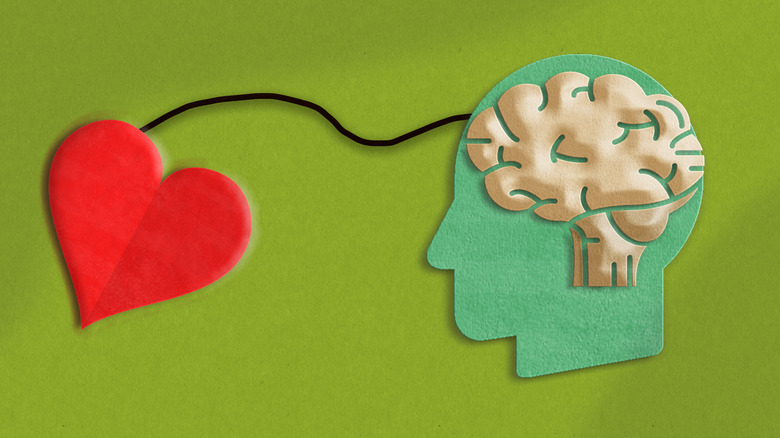The Truth About Gut Feelings And When You Should Trust Them
We all know what it's like to have a gut feeling over something. You're faced with a choice, and without even thinking, you know one of them just feels right. Explaining and justifying these decisions can be incredibly challenging, though. People are often skeptical about trusting their gut because it seems to go against the evidence-based decision making processes we are taught throughout our lives. The essential tenets of the scientific method dictate that we cannot make conclusions until we have concrete, objective evidence to support them, and gut feelings just don't work that way. At least, it doesn't feel like they do, but there's more to your instincts than you might think.
Instinctual feelings often manifest with nausea or a sinking sensation in the stomach, which is why we call them gut feelings in the first place. You should know that these physical sensations are not just tricks of the mind. There are nerves that connect our brains to our digestive tracts, which mean that we can literally feel emotions in our gut. Whether these feelings can actually guide us in the right direction is more complicated, and it truly depends on the circumstances. However, instincts are more evidence-based than you might think, and understanding where they come from can help us better recognize when we should trust our gut, and when it might be risky to.
Why you can feel emotions in your gut
The brain has a particularly strong connection to the digestive system, known as the gut-brain axis. The gut-brain axis depends on three key components, the first being the enteric nervous system (ENS), which controls the digestive organs. The ENS is the largest unit within the peripheral nervous system, one of the two main structural classifications of the nervous system overall. It is also the second largest neural network in the body after the brain itself, facilitating signals between the mind and the gut.
The second major component of the gut-brain axis is the vagus nerve, which extends all the way from the brain down to the large intestine. It splits at the esophagus, forming two branches that stretch down each side of the body which, in turn, send the signals that make the digestive tract function. Stress has been shown to inhibit signaling through the vagus nerve, which explains why stressful scenarios, like facing a difficult decision, can alter gastrointestinal functions.
The final component of the gut-brain axis that needs to be addressed is the gut microbiome. Each person has a microscopic ecosystem in their intestines, hosting bacteria, fungi, and even viruses and parasites. These microorganisms are involved in the production of neurotransmitters that carry signals from neuron to neuron. Every component of the digestive tract is closely bound to the brain, which is why people not only have gut instincts, but also feel nauseous when disgusted or feel a change in appetite when sad.
The real roots of intuition
The scientific community has developed a strong understanding of the link between the brain and the gut, so we know why stressful situations, like making a big decision, can have gastrointestinal effects. What's far less clear, however, is where our instincts come from to begin with. In other words, when faced with a choice, why do we get the sense that one is intrinsically right? The truth is, while gut feelings may seem unconscious, intuition stems from a logical thought process based on past experiences.
One of the principal elements of the difference between short-term and long-term memory is that long-term memory stores information we are likely to need again in the future. Gut feelings arise from that well of information collected over our lifetimes. When the brain sends stress signals to the gut, it's likely because the brain is drawing on a previous memory tucked far back in the mind. This thought process happens so quickly that, in most cases, we don't even notice it.
Emotions also play a huge role in shaping our instincts. Much of this comes through the amygdala. It's a portion of the brain that is heavily involved in processing emotions, and it's responsible for the instant emotional reactions we experience in response to certain scenarios. Furthermore, the amygdala plays a central role in unconscious memories, like when people remember how to ride a bike even after not doing so for years. Thus, the amygdala is deeply tied to the unconscious information that informs gut feelings.
Is it intuition or anxiety?
The amygdala is associated with many emotions, but none more so than fear. On the most fundamental level, the amygdala powers our survival instincts. This would have been key to avoiding predators and other natural threats in our primitive past, but it now manifests in the far more complicated threats of the anthropogenic world, and it isn't always helpful. The amygdala can sometimes overreact to potential risks, at which point it triggers anxiety. Anxiety can often overtake the logical side of our brain, causing more harm than good, so it's important to recognize when gut feelings are indicative of actual intuition versus paranoia.
Anxiety often presents the same physical symptoms as gut feelings, such as a queasy stomach, so it's hard to tell the difference by your digestive tract alone. However, there is one key difference between intuition and anxiety that you should always look out for. Intuition is very specific in scope, with gut feelings that point you towards a concrete decision. Anxiety and paranoia, on the other hand, are more nebulous, focused on broad fears about people and environments rather than singular scenarios. Furthermore, while the signs of gut feelings are usually subtle, paranoia tends to manifest as intense fear that can linger even after a problem is dealt with.
Emotional intelligence can improve intuition
Whether or not you can trust your gut is hardly a straightforward question, especially given the role that anxiety and paranoia can play in decisive moments. Fortunately, there are ways that you can hone your intuition so that gut feelings are more likely to lead you in the right direction. The key lies in recognizing that emotions can often clash with reason, and in the case of fear in particular, emotions can give us irrational ideas. However, trying to abandon emotion altogether and solely operate on logic isn't realistic, and it neglects an important part of humanity. Emotional intelligence is the intersection between emotions and reason. You need to be in touch with your emotions while simultaneously coming to a logical understanding of what triggers those emotions.
Building emotional intelligence starts with pausing to reflect. When you get a gut feeling, take a moment to tune into the voices in your head. Most people find that they have two mental voices: one powered by fear and one powered by reason. If those two voices do not align, your gut feelings might be the result of anxiety more than intuition, but if reason aligns with your gut, it's generally a good sign. Getting more in touch with your emotions, and what kinds of scenarios trigger them, will help you better understand what your gut feelings are based on.
When to trust your gut
The most important question to answer is, when is it right to trust your gut? As you've probably gathered, the answer is sometimes, and it really depends on the circumstances at hand. Building emotional intelligence can improve your intuition in the long run, but there are also things you can do in the moment when a gut feeling hits you. Although the feeling will likely hit you in an instant, it's important to pause at that point and think through the situation. Start by asking yourself what prior experiences in your life might be causing the gut feeling. The more you know about the subject at hand, the more you can trust your instincts. For example, experienced chefs tend to develop an innate instinct that tells them how much of a particular ingredient to add to a dish without having to use measurements.
Gut feelings are also an opportunity to use the scientific method in everyday life. Think of the gut instinct as a hypothesis that your unconscious mind is proposing. Instead of jumping to a conclusion based on that hypothesis, follow the scientific method and make objective observations of the scenario. Ask yourself how much concrete information you really know about the circumstances, whether your worst-case fears are realistically possible, and most importantly, what evidence is there to go against your gut instincts? If your observations support your instincts, it's probably safe to trust your gut.





